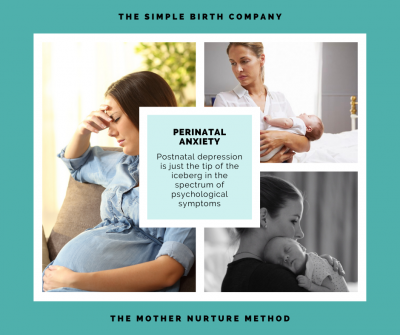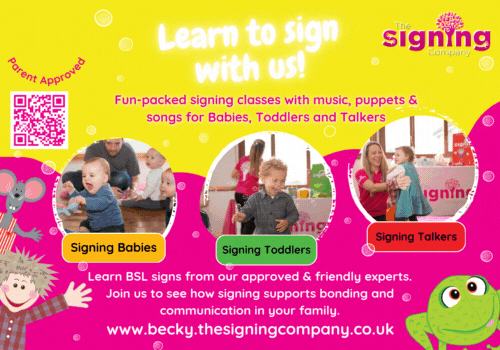Most women are aware of the potential for postnatal depression, and it is something that is on everyone’s radar. It is one of the main downsides to pregnancy and birth that is often talked about and so people’s awareness of it is high.
You will be asked about how you are feeling as part of your midwife and health visitor appointments to so they can check on your wellbeing, and flag any warning signs of postnatal depression, as you navigate those early weeks of motherhood.
Perinatal Anxiety
However, what isn’t given as much focus is perinatal anxiety, which can occur during early pregnancy, even sometimes as early as during fertility treatments. Anxiety is less understood and therefore dismissed quite easily as just being hormonal, linked to baby blues or part and parcel of those early days with a newborn. It is not normal, and should not be left untreated.
Anxiety can have just as many consequences and long term impacts on both mother and baby as depression, and need to be carefully understood, managed and supported in order to reduce those impacts.
The effects of perinatal anxiety on your body can include; feeling lightheaded or dizzy, having pins and needles, feeling restless, fast breathing, irregular heartrate, sweating and hot flushes, insomnia, teeth grinding, nausea, lowered libido and panic attacks.
The effects on your mind may create feelings of dread, paranoia, a feeling that bad things might happen if you stop worrying, a feeling that you’re not living in reality, overthinking things from the past or things that are yet to happen in the future and a feeling of disconnect from yourself and your life and/or baby.
Postnatal depression is in fact just the tip of the iceberg when it comes to the spectrum of psychological symptoms a new or expectant mum may experience. Of the numerous women I have dealt with over the years, particularly since Covid hit, anxiety has been the leading cause of their issues, rather than postnatal depression.
Struggles with depression, anxiety or mood disorders can start incredibly early in pregnancy and not just postnatally. And the anxiety mums may be experiencing along that journey can be so prominent that it covers up a multitude of other issues.
Studies
Many studies have been done on the effects of depression from pregnancy to motherhood and its impact on baby/child development, but little has been done to study and understand the impact anxiety also has in that perinatal period. Preliminary studies in this area now shows that maternal anxiety, independent of depression, may also adversely affect the child too.
On a study done on 1336 Norwegian women and their children from 17 weeks pregnant through to 8 weeks postpartum, reports showed that:
· 8.2% experienced prenatal anxiety
· 4.0% had postpartum anxiety
· 4.4% had anxiety during both pregnancy and postnatally
The results of which were:
· 5.6% of the 2-year-old children of these mothers showed problems in their social-emotional behaviour
· These problems were more common in those exposed to maternal anxiety in both the pregnancy and postnatal period
NHS reports suggest that around 20% of new and expectant mums are now dealing with perinatal anxiety, so it is on the rise, and needs to be given the focus it deserves so that we can support these women now.
What you are experiencing with anxiety is your body’s physical response to your internal struggle that has erupted. You are experiencing a huge psychological change that is laden with old belief systems, negative thought processes and an extremely negative internal voice that keeps you stuck in the never-ending anxiety cycle. This cycle can be hard to break free of, hence the reason people can struggle for years on end, if not lifetimes with these symptoms. Your stress response is triggered by your perceived apprehensions, doubts, worries and fears, and that stress response is trying to get you away from a situation it believes to be real, and to a place of safety. It doesn’t know that what it is reacting to is what is going on in your mind, and in fact not, a real time event, and you can’t run away from your mind.
Whether you are experiencing anxiety, depression, panic attacks or any other symptom of your internal struggle, I want you to know this….there is nothing “wrong” with you and there is a way out of how you are feeling to lead a more emotionally balanced life.
Many interventions for anxiety can give short term solutions because they mask the symptoms rather than deal with the root cause issues. With short term solutions, your old habits, thoughts, feelings and emotions can soon creep back in, which can lead people to think there is just something inherently wrong with them or imbalanced. This is not true.
The anxiety and stress-based symptoms you experience is your body’s way of readying you for a challenge. That is pretty amazing! Except that challenge never comes because most of it is occurring is in your mind, like worrying about future events, imagined scenarios that we believe to be true, or playing over conversations we wish we had or want to have.
The good news….there is life beyond anxiety, and I know the thought of that is both appealing and scary if you’ve lived with anxiety for so long….but the life you want to lead, anxiety and fear free, is entirely possible and could be here quicker than you think.
My Mother Nurture Method programme, is a transformational 8 week programme that will help you overcome your anxiety, fears and worries so that you can enjoy, and flourish in, your journey from fertility to motherhood, just that way that you wanted to. By the end of those 8 weeks you will go from feeling overwhelmed, anxious and unsure, to calm, content and emotionally in control.
You can find out more about my programme here:
https://thesimplebirthcompany.com/mother-nurture-method
Or book in for a free call using the link below, where you can tell me about the challenges you are facing as we will map you out a way forward:
https://calendly.com/simple-birth-company/coffee-chat
Warm Wishes,
Ria Oliver
The Motherhood Empowerment Coach








 Browse the site
Browse the site








